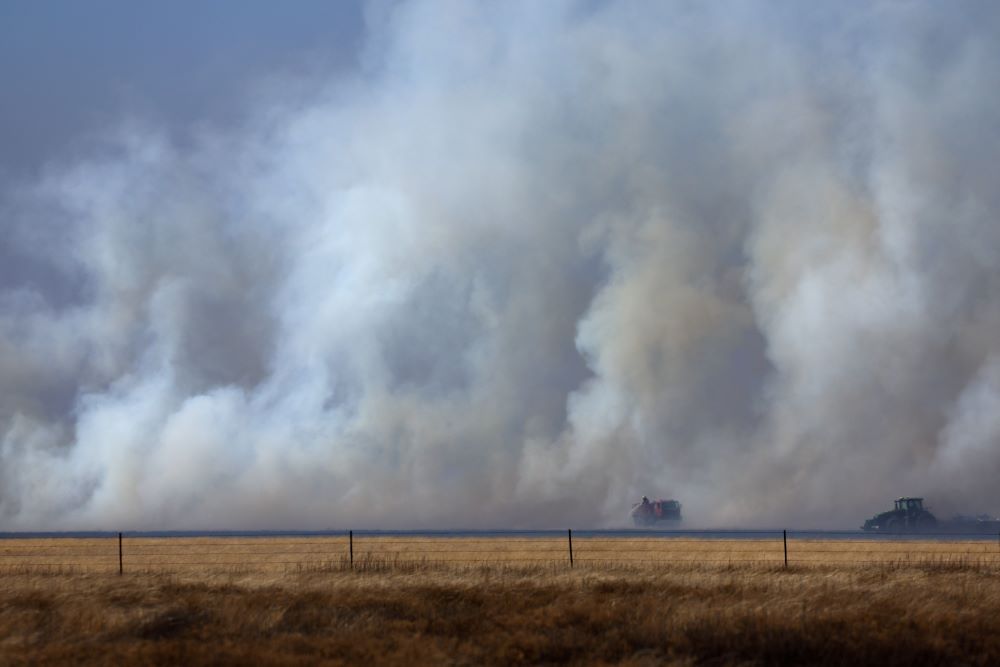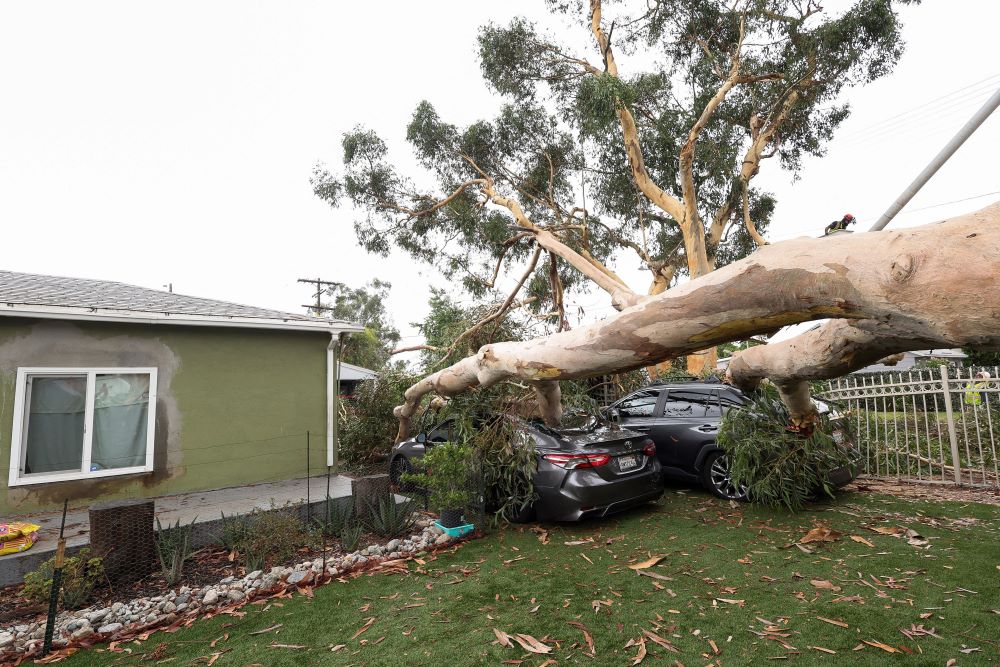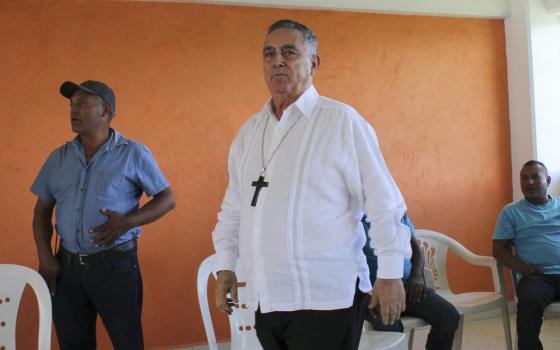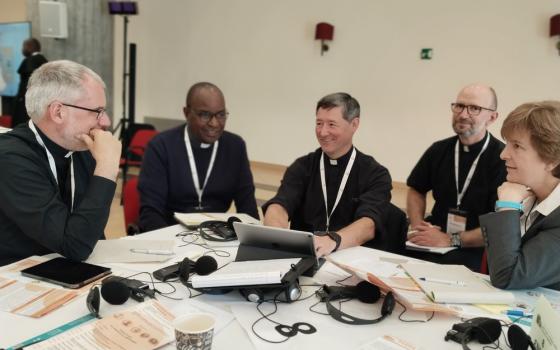
Local firefighters work to contain a wildfire after it was whipped up by high winds in Pampa, Texas on March 2. (OSV News/Reuters/Leah Millis)
With Earth Day right around the corner on Monday April 22, I was delighted to receive a newly translated book by the late Catholic French philosopher and social scientist Bruno Latour titled If We Lose The Earth, We Lose Our Souls. This is Latour's final book. A note at the beginning states that Latour had read and corrected the proofs to the French edition of this book just a few days before he entered the hospital in September 2022, but that his death Oct. 9, 2022, at age 75 meant that he did not live to see the volume in published form.
This small book collects three essays and an interview with the journalist Jesuit Fr. Antonio Spadaro. In his foreword, the French priest Fr. Frédéric Louzeau explains that these texts from Latour challenge "Christians and theologians concerning the fate of the earth and humanity." Put simply, Latour exhorts theologians, as the experts and scholars of the tradition, to "pay attention to the earth" especially now "at a time when it is being neglected."
Latour, whose philosophical research was influential in the establishment of an interdisciplinary field called "science and technology studies" that examines the complex factors that contribute to the discovery of new ideas and information, focused much of his last years on the pressing issue of global climate change and the ecological crises that it has wrought. The titles of his most recent books illustrate this interest well: Facing Gaia: Eight Lectures on the New Climatic Regime (2017), Down to Earth: Politics in the New Climatic Regime (2018), On the Emergence of an Ecological Class: A Memo (2022 with Nikolaj Schultz), and How to Inhabit the Earth: Interviews with Nicolas Truong (2024).
As a theologian who is also a member of a philosophy department, I appreciate how a philosopher is interested in engaging theologians as Latour does in If We Lose the Earth, We Lose Our Souls. One of the fundamental principles Latour embraced in his reflections on ecology and the climate crisis is the fallacy of anthropocentrism.
In a lengthy 2018 New York Times Magazine profile of Latour, this critique of human separateness and inflated superiority comes through clearly. "The idea that we can stand back and behold nature at a distance, as something discrete from our actions, is an illusion, Latour says," the article says. "In our current environmental crisis, he continued, a new image of the earth is needed—one that recognizes that there is no such thing as a view from nowhere and that we are always implicated in the creation of our view."
Regular readers of my column will immediately recognize the resonance with my own theological and philosophical outlook. Furthermore, this is a theme that is central to my 2018 book All God’s Creatures: A Theology of Creation.
But I appreciated Latour's latest book not because it merely reflected back to me views I already held, but because it speaks directly to theologians as theologians and pastoral ministers as pastoral ministers. He challenges professional theologians to take seriously the earth and climate crisis in the work of faith seeking understanding, and he amplifies Pope Francis' admonitions in Laudato Si', and more recently Laudate Deum, for pastoral ministers and all people of goodwill to embrace ecological conversion.

A fallen tree lies over two cars in Sun Valley, Calif., Aug. 21, after Tropical Storm Hilary swept through the area. Hilary was the first tropical storm to hit Southern California in 84 years. (OSV News/Reuters/Mario Anzuoni)
In an address to Catholic theologians in Europe that is published in this volume, Latour exhorts his hearers, stating that
we must learn to rematerialize, in a thousand different ways, our belonging to the Earth. This immense rupture in conceptions of the world offers theology the opportunity to rethink, once again, as it has always managed to do in times of crisis, how to accompany the renewal of preaching, now that this preaching is liberated from cosmological projections that no longer correspond to the demands of the time.
Here Latour is addressing the two intersecting themes he felt were most urgent for theologians to hear. First, the way Catholic theologians are doing theology may be viewed as outmoded or even irrelevant if it doesn't take into consideration the global ecological catastrophe that is unfolding before us and of which we are a part. A new theological imaginary is needed; new language and frameworks are necessary.
Second, Latour is concerned about how this renewed theology is transmitted to the broader community of believers. Here he focuses on the importance of good preaching, which Latour sees as an important means of relaying the truth about the world we currently inhabit to the people of faith. This arises directly from what he calls, "my fear that I am unable to share the message with my fellow human beings," perhaps owing to the limitations he sees in academic conversations.
It should be noted that Latour is not restricting his use of the term "preaching" to liturgical homiletics alone. Instead, he is describing a style of speaking, one that proclaims a message that invites conversion. Modeled after the preaching of the Gospel — here we might think of the early Christian kerygma or proclamation of the good news — Latour is calling for a compelling, direct, and invitatory style of communication that connects with people today to see reality as it actually is, especially in light of ecological disaster.
In another essay in this book, Latour builds on the need for "preaching" by calling for accompanying "rituals." He writes:
Where are the rituals, the ceremonies, the hymns that have made us of Laudato Si’ to make evangelical preaching comprehensible, not to those on the inside, ad intra, but to those, ad extra, for whom it has become totally foreign—I am referring of course to the vast majority of our fellow citizens, wince complete non-comprehension of Christian preaching has become the default position today.
This insightful observation links the need for effective communication about the new global context in which we find ourselves and the rituals or practices that must be invented to assist in such communication, education and appropriation. In many ways, this line of thinking reflects what has often been described as the distinctly "Catholic imagination." Latour's vision proposes using the Catholic liturgical frame as a model for conceptualizing the climate crisis and then responding to it, complete with "metaphors, hymns, gestures, invocations, prayers."
Advertisement
The last thing I want to highlight is Latour's retrieval of eschatology as a central theological theme we must take seriously in the age of climate catastrophe. In an interesting reflection, Latour considers how so many Christian depictions of the end times are portrayed as destruction coming from above, from a divine source punishing humanity for its wicked ways, which is something anticipated in various scenes from Scripture.
However, he notes,
"In a stupefying and completely unforeseen fashion, the end time has burst in, not as the realization of a promise finally fulfilled from above; not as the always-renewed expectation of a truth that cannot be accomplished without betraying itself; but as the realization, alas factual, objective, temporal, of a reality for which humans—certain humans more than others—are alone responsible.
This reframing of the "end time," the eschaton and apocalypse of a sort, is, as Latour puts it, both immanent (it is earthly and material) and imminent (it is happening now). "Not for a second do we have the right to forget that the end time is a reality for a very large number of species," he writes. "It would be particularly disgraceful to want to replay the scene of Francis preaching to the birds while holding up to today’s fowl the promises of the apocalyptic Revelation, given that so many of those species are in the process of disappearing for good, victims of that sixth extinction of which we have become the agent."
As we prepare to mark another Earth Day, I hope many of us will take Latour's insights and challenges to heart. Let us not simply think of the Earth one day a year in April but recall every day that we are also dust of the earth (Genesis 2:7) and have a responsibility to our fellow creatures who share our common home.











